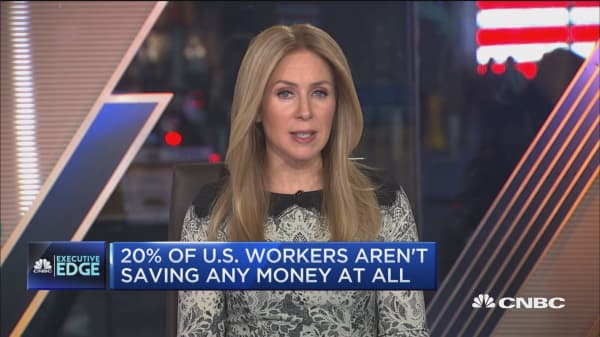You've probably heard of the FIRE — financial independence, retire early — movement, the trend that's taken hold among individuals who are mostly in their 20s and 30s.
But you probably haven't heard of the "super savers," Americans age 45 and older who are putting away at least 20 percent of their income — or $1 out of every $5.
A new online survey from TD Ameritrade of 1,503 individuals in September and October found that 20 percent count as savings over achievers.
"Most are choosing this path because they're looking at the freedom and flexibility it offers," said Dara Luber, senior manager of retirement at TD Ameritrade. "They are looking for financial security and peace of mind, and they're thinking that their retirement will be like a second childhood."
The survey found that 57 percent of super savers plan to retire earlier than their parents did, versus 46 percent of non-savers.
Sign Up for Our Newsletter Your Wealth Weekly advice on managing your money SIGN UP NOW Get this delivered to your inbox, and more info about about our products and services.By signing up for newsletters, you are agreeing to our Terms of Use and Privacy Policy. .investigation-wrapper .description{ text-align:center; padding-bottom:15px; } .nl-privacy{ font-size: 10px; padding-top: 20px; display:block; } .wildcard .investigation-wrapper { -webkit-box-shadow: 0px 0px 4px 0px #999999; /* Android 2.3+, iOS 4.0.2-4.2, Safari 3-4 */ box-shadow: 5px 5px 5px 0px #999989; } .subsection .investigation{ background: #efefef; border-radius: 3px; padding: 10px 20px 20px 20px; } .investigation small{white-space:normal;} .subsection .investigation h1{ text-transform: uppercase; text-align: center; font-family: "Gotham Narrow Ssm 5r"; margin-bottom: 0px; padding-bottom:0px; font-size: 18px; margin-top: 10px; word-spacing: 1.5px; color: #333333; } .subsection .investigation .headline_title { font-size: 28px; padding-top: 20px; display: block; font-family: "Gotham Narrow Ssm 7r"; padding-bottom:5px; } .subsection .email-info { background: rgba(74, 144, 226, 1); max-width: 140px; margin: 0px auto; text-align: center; padding: 6px 1px; color: #fff; border-radius: 5px; } .subsection .email-info { color:#fff; } .subsection .email-info:hover{ background: #2077B6; } body .subsection.investigation-wrapper{overflow:visible;}
In order to achieve those goals, they are avoiding high-interest debt and sticking to a budget.
And there are a few things they are doing differently.
Investing moreSuper savers are making investments a priority even over their housing and daily costs.
These over achievers are putting away 29 percent of their income compared to others, who are investing just 6 percent of their money, on average.
"They're not downsizing their lifestyle. They're not looking to move to cheaper states, necessarily," Luber said. "They're just spending smarter and saving smarter."
Starting earlyMore than half of super savers — 54 percent — started investing by age 30. Almost a third of them — 30 percent — started by age 25.
In comparison, 39 percent of non-super savers started by age 30, and just 20 percent of them by 25.
"Saving becomes ingrained in everything they do, and it's a priority for them," Luber said.
More from Fixed Income Strategies:
The top 10 cities where you should spend retirement
Medicare won't cover this key expense
Cut these unnecessary expenses and save thousands a year
While super savers are active investors, they also prioritize low- and no-fee investments.
These individuals are more likely to own low-cost exchange traded funds, at 47 percent, versus just 31 percent of non-savers.
Super savers are also more likely to invest in low- or no-fee brokerage accounts.
Diversifying retirement savingsWhen it comes to retirement accounts — 401(k) plans, individual retirement accounts, annuities and health savings accounts — super savers are more likely to own them all.
The one account that most distinguishes them from other individuals is post-tax Roth IRAs. About 53 percent of savings overachievers have Roth IRA accounts, versus 29 percent of other savers.
"They're looking at their future and saying, 'If I pay taxes today, I could potentially have more tomorrow,'" Luber said.
show chapters 20% of all US workers aren't saving any money, report finds 7:28 AM ET Thu, 14 March 2019 | 00:59
20% of all US workers aren't saving any money, report finds 7:28 AM ET Thu, 14 March 2019 | 00:59
No comments:
Post a Comment